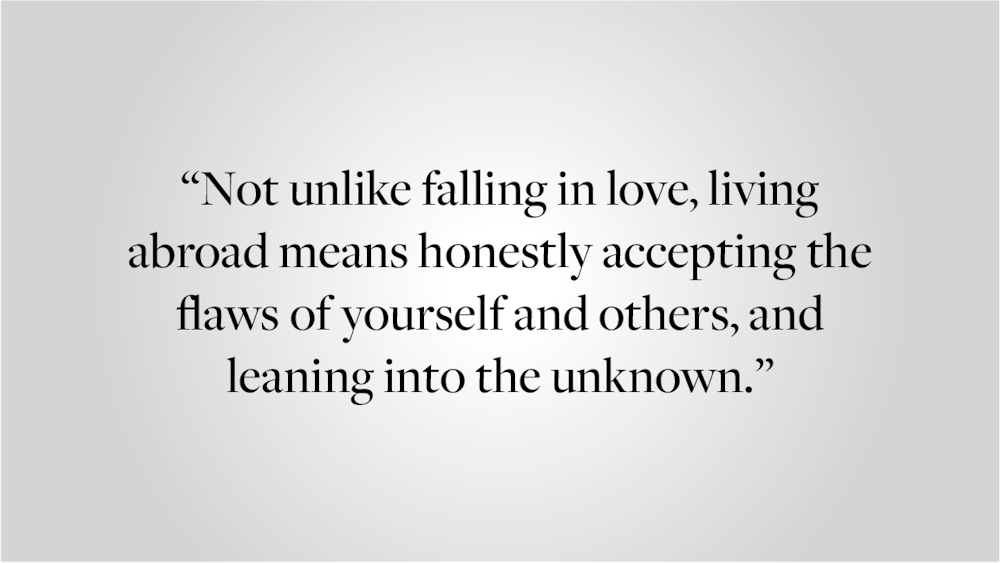One of the first ads I saw on the Paris metro when I arrived as an exchange student was for a French dating app called Fruitz. The app asks you to choose between four fruit icons to indicate what sort of relationship you are looking for. Although new to me, this concept seems to be quite popular in France, as other competitors, including Feels, use a similar model with emojis. Some of my fellow exchange students caught on to these apps and were swiping left and right before the jet lag wore off. I, however, have spent most of my time trying to acclimate myself to a culture with which I was already quite familiar, but evidently, not familiar enough. My friends and I were in the throes of the same fundamental experience: embracing vulnerability in the search for something new. Not unlike falling in love, living abroad means honestly accepting the flaws of yourself and others, and leaning into the unknown.
One hindrance to embracing vulnerability in both living abroad and falling in love is the ever-so-seductive honeymoon phase. With our new homes and new partners, we refuse to perceive their flaws, instead seeing them in idealized, often unrealistic ways. The honeymoon phase highlights the difference between infatuation and love — , and that between a tourist and a resident. Expanding an experience beyond the honeymoon phase comes with time — so a short relationship or a brief trip abroad often won’t last long enough to evolve into anything beyond pure ecstasy. After all, it’s easy to say that you love Paris if you haven’t spent enough time here to be confronted with rampant anti-vax protests or the city’s ongoing housing and homelessness crises. Thus, moving past the honeymoon phase can be difficult: It takes courage to recognize the imperfections in something that has become so important to you in such a short period of time.
What often follows the honeymoon phase is frustration, which also pushes you toward vulnerability. Just like all those annoying tics, habits and idiosyncrasies that become apparent in a partner after a while, a picturesque paradise abroad quickly becomes a hassle and a half. Anyone who has ever had to deal with French bureaucracy in the government or in university systems — some annoying idiosyncrasies to be sure — can identify with this feeling viscerally. Despite our desire as students abroad to be self-reliant and not look clueless, this bubbling frustration can make it hard to blend in. In order to fix a critical visa registration issue, you have to admit that you don’t know how to fix it on your own. The same is true early in relationships, as everyone wants to appear easygoing. But to resolve and move past conflict with your partner, you have to be vulnerable enough to name the issue and confront it with them.
A fear of imperfection is another hurdle to integrating into a new society and developing interpersonal intimacy. Parisians have a reputation for switching to English the second they hear your accent, but the French as a whole are quite different. Unlike in American culture, it’s not always considered rude in France to correct an interlocutor’s grammar while they are talking. As a result, French people tend to be tentative about exercising their skills in a foreign language for fear of making mistakes. And because of Americans’ reputation for being monolingual, if the French hear you speaking English, they’ll assume you don’t speak French. What a quick route to a missed connection. Of course, I understand their apprehension. Even as a French concentrator who has previously spent significant time in France, I wince at every interaction where I make an obvious grammatical mistake or where my accent slips. But our shared timidity shouldn’t stop any of us from trying. Courtship is similar: Choosing to remain guarded out of fear of making “mistakes” makes for shallower and less meaningful connections and hinders emotional intimacy.
In her 2010 TED talk, Brené Brown named vulnerability as the key to connection and belonging. It can be scary to share your imperfections with others, especially as a student in a foreign country, but it can be the most rewarding step in the acclimation process. Only through opening up to your partner about your needs and expectations can you create new trust and intimacy in the relationship. And in a foreign country, by swallowing your pride and asking a local classmate for help understanding a difficult assignment, you might grow your fluency in the language and make a new French friend. As a local relative reminded me, the French tend to be shy, so you might need to be the one to put yourself out there first. Of course, having the courage to admit uncertainty or imperfection is often easier said than done. I can think of no better place than the city of love to do that hard and joyful work.
Yasmeen Gaber ’23 can be reached at yasmeen_gaber@brown.edu. Please send responses to this opinion to letters@browndailyherald.com and other op-eds to opinions@browndailyherald.com.





